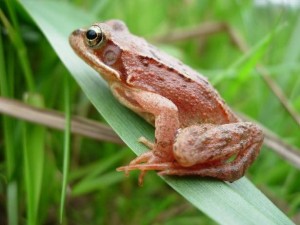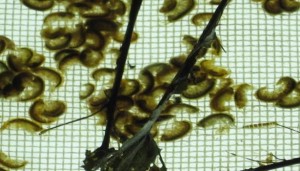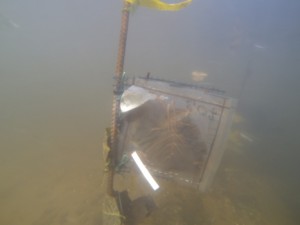In this post, the team Functional Aquatic Ecotoxicology offers three new thesis topics.
Topic I: What triggers detritus quality for tadpoles?
Surprisingly little is known about the factors triggering the quality of detritus (e.g., decomposing leaf litter) as a food resource for tadpoles. In this context, also the importance of microbial conditioning for these animals has not yet been assessed. During conditioning, leaf-associated microorganisms degrade recalcitrant structural leaf components (e.g., cellulose), while nutrient-rich microbial biomass is produced. At the same time no information is available on how these processes may be affected by global change-related aspects such as pesticide exposure (fungicides are of particular interest here because of their negative effects on microbial conditioning) and the spreading of invasive plant species.
To address this gap of knowledge, this thesis makes use of a factorial design unraveling the significance of microbial conditioning, fungicide application, and spreading of invasive plants as well as potential interactions of these factors on the detritus quality for tadpoles of the common frog (Rana temporaria). The animals will be fed on different diets until metamorphosis and their energy processing and final physiological fitness will be assessed.
Thesis type: BSc/MSc, start: February/March, prior knowledge required: some lab experience would be desirable
Topic II: Determination of species-specific trophic enrichment factors (TEFs) for Gammarus fossarum at different stress levels
Stable isotopes of an element are non-decaying atoms with the same number of protons and electrons but a differing number of neutrons. The quantification of the ratios of these lighter and heavier forms of nitrogen and carbon is considered a powerful tool to understand species interactions and reconstruct food webs in laboratory and field experiments. This is because consumers mirror the stable isotope signature of their prey with just a little offset (so-called trophic enrichment factors or TEFs). However, this little offset can complicate the correct interpretation of dietary relationships among species if they are imprecise (see a very informative blog post on this topic here).
As a basis for upcoming studies, this thesis will determine species-specific TEFs for the amphipod Gammarus fossarum by conducting a long-term feeding study with plant and animal food. Additionally, gammarids will be exposed to different stress levels (realized by insecticide exposure) to assess the potential impact of stress on trophic enrichment.
Thesis type: BSc/RPC, start: possible from February/March on, prior knowledge required: no
Topic III: Litter mixture effects on leaf decomposition by microorganisms and macroinvertebrates along a pesticide gradient
Leaf litter decomposition is a fundamental ecosystem process in stream ecosystems that depends on the interplay of different organism groups but also on the habitat-specific species assemblage. Also the mixing of leaves of different tree species can have large effects on the overall litter decomposition in a habitat via mechanisms such as complementary resource use by microbial decomposers and macroinvertebrate leaf-shredders or the active (via fungal hyphae) and passive nutrient transfer between litter types. Additionally, the spreading of invasive tree species may affect these processes and interactions as they can be decomposed at a slower rate than species being decomposed in their “home environment” (the so-called home-field advantage). Despite the importance of these interactions, little is known if they can be modulated by anthropogenic stressors.
Therefore, this thesis will assess litter mixture effects along a pesticide use gradient during a field study in Romania, where agricultural production is still extensive with minor or no use of pesticides. Travel expenses and costs for housing will be covered.
Thesis type: MSc, start: possible from March on, prior knowledge required: some field experience would be desirable
All offered theses will be supervised by Jochen Zubrod and Mirco Bundschuh. Interested? Contact us via email or stop by (building CI, room 101a)!
Jochen Zubrod: zubrod@uni-landau.de
Mirco Bundschuh: mirco.bundschuh@slu.se or bundschuh@uni-landau.de



